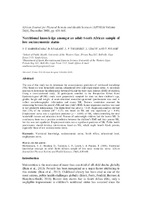Nutritional knowledge amongst an adult South African sample of low socioeconomic status
Date
2018Author
Mabweazara, S. Z.
Rivalani, D.
Tsolekile, L.P.
Leach, L.
Puoane, T.
Metadata
Show full item recordAbstract
The aim of this study was to determine the socioeconomic predictors of nutritional knowledge
(NK) based on total household income, educational level and employment status. A secondary
aim was to determine the relationship between NK and the body mass indexes (BMI) of children.
Using a cross-sectional study, 39 participants enrolled in the Prospective Urban Rural
Epidemiological (PURE) study were purposively sampled for data on their children’s age,
gender, height and weight. A semi-structured researcher-generated questionnaire was used to
collect sociodemographic information and assess NK. Pearson correlation assessed the
relationship between the parent’s NK and their child’s BMI. Linear regression analysis was used
to test predictive relationships. The Alpha level was set at p < 0.05. Regression analysis showed
that 2.5% of the variance (R2 = 0.25) was based on NK and was significant (p < 0.05).
Employment status was a significant predictor (p = -0.038) of NK, when controlling for total
household income and education level. Parents of underweight children had the lowest NK. In
conclusion, there was a positive correlation between the children’s BMI and their parents NK,
but this was not significant. Employment status was a significant predictor of NK. Public health
practitioners should develop interventions based on NK, which might benefit black parents,
especially those of low socioeconomic status.

